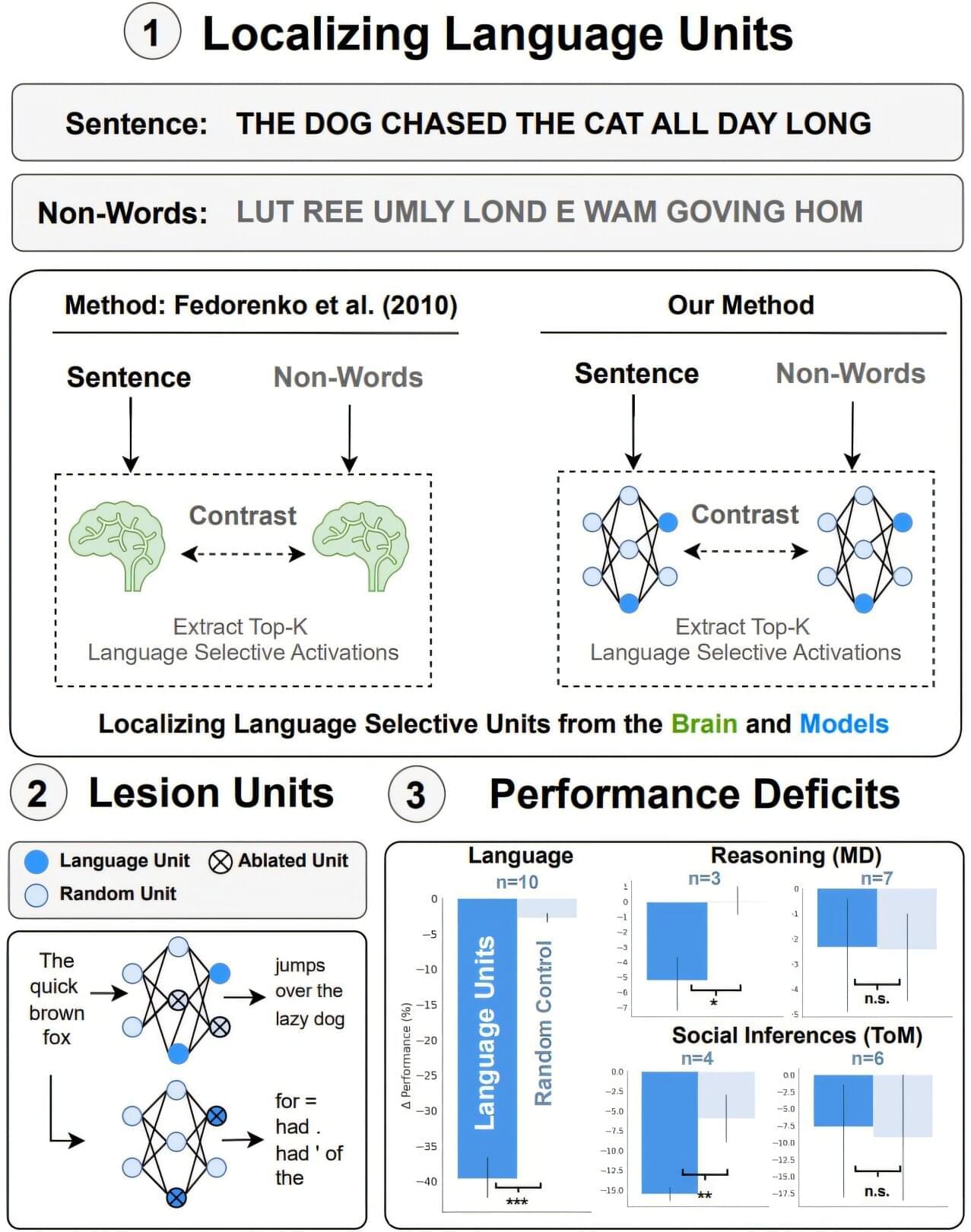The Diary Of A CEO
Category: employment – Page 9

Key units in AI models mirror human brain’s language system
EPFL researchers have discovered key “units” in large AI models that seem to be important for language, mirroring the brain’s language system. When these specific units were turned off, the models got much worse at language tasks.
Large language models (LLMs) are not just good at understanding and using language, they can also reason or think logically, solve problems and some can even predict the thoughts, beliefs or emotions of people they interact with.
Despite these impressive feats, we still don’t fully understand how LLMs work “under the hood,” particularly when it comes to how different units or modules perform different tasks. So, researchers in the NeuroAI Laboratory, part of both the School of Computer and Communication Sciences (IC) and the School of Life Sciences (SV), and the Natural Language Processing Laboratory (IC), wanted to find out whether LLMs have specialized units or modules that do specific jobs. This is inspired by networks that have been discovered in human brains, such as the Language Network, Multiple Demand Network and Theory of Mind network.

“AI Is Coming for ALL Your Jobs” — Tech CEO’s Internal Memo Leaked
🤖💰🦾Bots coming for your job. David Shapiro explains it succinctly.
All my links: https://linktr.ee/daveshap.
00:00 — Chatbots Saturation.
05:39 — CEO Memo

Meet The New Amazon Robot That Can Feel What It Touches
Amazon has a new warehouse robot that, for the first time, can “feel” the items it’s handling. CNBC got an exclusive first look at Vulcan in action at a warehouse in Spokane, Washington, where it stows items in tall yellow bins. Until now, only humans could handle the stowing job, but Amazon says Vulcan will create new jobs instead of eliminating them. Amazon wouldn’t disclose how much it cost to develop Vulcan, but it says it took three years and a team that’s grown to 250 people.
Chapters:
0:00 Introduction.
1:24 Sense of touch.
5:30 Replacing workers?
8:22 Speed, safety and scale.
Produced and shot by: Katie Tarasov.
Edited by: Evan Lee Miller.
Senior Director of Video: Jeniece Pettitt.
Animation: Mallory Brangan.
Additional Footage: Amazon, Getty Images.
» Subscribe to CNBC: https://cnb.cx/SubscribeCNBC
» Subscribe to CNBC TV: https://cnb.cx/SubscribeCNBCtelevision.
» Watch CNBC on the go with CNBC+: https://www.cnbc.com/WatchCNBCPlus.
About CNBC: From ‘Wall Street’ to ‘Main Street’ to award winning original documentaries and Reality TV series, CNBC has you covered. Experience special sneak peeks of your favorite shows, exclusive video and more.
Do you want a new career that’s higher-paying, more flexible or fulfilling? Take CNBC’s new online course — How to Change Careers and Be Happier at Work. Pre-register today and use coupon code EARLYBIRD for an introductory discount of 30% off $67 (+taxes and fees) through May 13, 2025: https://cnb.cx/4igNyqZ
NVIDIA CEO Jensen Huang | Rebuilding Industrial Power: AI Factories & the Return of US Manufacturing
NVIDIA CEO Jensen Huang discusses the concept of AI factories—systems that transform electricity into computational intelligence—and explains how AI represents an industrial revolution that will transform every industry, create new jobs in tech and trades, and enable advanced manufacturing through digital twins and physical AI.
Follow on X:
@jacobhelberg (Jacob Helberg)
YouTube: https://www.youtube.com/@HillValleyForum.
Apple: https://podcasts.apple.com/us/podcast/the-hill-valley-forum-podcast/id1692653857
Spotify: https://open.spotify.com/show/39s4MCyt1pOTQ8FjOAS4mi.
Timestamps:
(0:00) Introduction and Jensen’s opening statement on AI’s impact on jobs.
(0:38) Welcome and initial question about AI factories.
(3:17) Discussion of AI as a paradigm shift in modern computing.
(4:51) Explanation of physical AI and its evolution from perception to reasoning.
(9:46) Analysis of what the US needs to do to win the global AI race.
(13:04) Impact of AI on the workforce and job market.
(17:55) How AI enables reshoring and manufacturing through digital twins.
(22:19) Timeline predictions for AI-enabled robots becoming ubiquitous.
(23:52) Closing
AI Will Give Everyone The Power Of A 10,000-Person Company: Mark Zuckerberg
AI is slated to disrupt traditional jobs, but could also give all people previously unthinkable leverage.
Mark Zuckerberg, CEO of Meta Platforms, has shared some compelling thoughts on the future of artificial intelligence. On a podcast, he posited that AI will eventually surpass individual human intelligence, but, interestingly, argued that this is already happening in a certain sense. His core idea revolves around the combined intelligence of large organizations already functioning as a form of “superintelligence” that individuals can tap into, a power he believes AI will democratize.
“I think that we’re going to get general intelligence,” Zuckerberg stated. “We’re going to have systems that are smarter than any individual, and I think it’s mostly going to be very empowering for people.”

What If Everything Changed? | Robin Hanson | TEDxNorrköping
Whar may happen when the first truly smart robots appear, based on brain emulations or ems. Scan a human brain, then run a model with the same connections on a fast computer, and you have a robot brain, but recognizably human.
Train them to do some job and copy it a million times: an army of workers is at your disposal. When they can be made cheaply.
within perhaps a century, they will displace humans in most jobs.
In this new economic era, the world economy may double in size every few weeks.
Applying decades of expertise in physics, computer science, and economics.
and use ofstandard theories indicate a detailed picture of a world dominated by ems.
Associate Professor of Economics, and received his Ph.D in 1997 in social sciences from Caltech. Joined George Mason’s economics faculty in 1999 after completing a two year post-doc at U.C Berkely. His major fields of interest include health policy, regulation, and formal political theory. Recent book: The Age of Em: Work, Love and Life When Robots Rule The Earth. Oxford University Press, 2016.
This talk was given at a TEDx event using the TED conference format but independently organized by a local community.